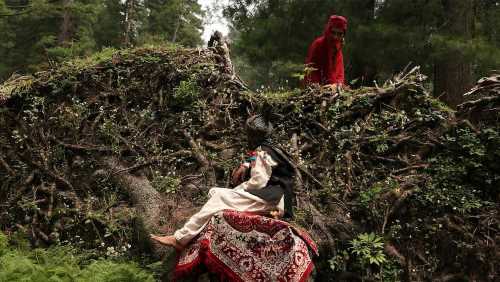Folklore, feminism and film noir come together in Pushpendra Singh’s meticulously crafted fourth feature “The Shepherdess and the Seven Songs.” Set in the disputed Jammu and Kashmir region in Northwest India, this moody fable about an unhappy young bride plotting her escape from tradition and patriarchy is a gripping character study that stutters slightly in the latter stages before producing a magical finale that no-one will forget in a hurry. Singh’s beautifully shot film has traveled extensively on the festival circuit and picked up awards at Hong Kong and Jeonju since debuting at Berlin in 2020. Specialty distributor partners Deaf Crocodile Films and Gratitude Films have acquired the film for U.S. release.
Singh’s penetrating study of toxic patriarchy and female identity is based on a short story by Vijayadan Detha, the acclaimed Rajasthani author known for bringing modern and often provocative sensibilities to folk tales. Singh previously adapted Detha’s novel “Lajwanti” for his 2014 feature debut. “The Shepherdess” is also strongly influenced by the writings of Lalleshwari, a 14th-century female Kashmiri poet and mystic whose musings on life, death and destiny are sung by the film’s heroine and form part of the inner voice that guides her bold and dangerous quest for freedom.
It’s clear from the outset that Laila (Navjot Randhawa) is defined in masculine terms as being not much different from livestock and has no option but to marry Tanvir (Sadakkit Bijran), a weak-willed nomadic herdsman. The only test he must pass to prove his worth and secure a bride is to lift a heavy rock in front of an all-male tribal council. With the songs and free-spirited life of Lalleshwari as sources of comfort and hope, Laila follows her husband’s tribe and its multitude of cows, sheep and goats on the annual trek through disputed territory that has brought India and Pakistan to war three times since 1947. Amid rising tension and paranoia, nomadic herders are no longer able to move with freedoms of the past. “The old ways won’t be allowed anymore,” they’re told. Official permission, residency status under section 35A of the Indian constitution and registration with India’s Aadhar identity card system are all part of the modern travel equation.
Geopolitics plays only a minor role in the story. The focus is firmly placed on how humans respond to the presence of powerful government authorities whose decisions about enforcing or ignoring rules can drastically alter the course of lives. In Laila’s case, it is the lustful desires of sleazy forest ranger Mushtaq (Shahnawaz Bhat) and his superior in the local police force (Ranjit Khajuria). Both men believe it is nothing more than their natural right to seduce and control the beautiful newcomer. But they have not reckoned with Laila’s mental and physical resolve. When Mushtaq and his boss make hopelessly inept sexual advances, they are beaten up and humiliated by the resentful and utterly disinterested woman. “She is a different breed,” says the cop, who considers disfiguring Laila’s face as punishment for rejecting him.
Divided into seven chapters with titles such as “Song of Marriage, “Song of Attraction” and “Song of Realization,” the story takes on the characteristics of film noir when Laila hatches a risky plan to repel the unwanted men in her life. With a husband who supplies depressing, passionless sex and says “it is a sin to be born beautiful in a poor family” while advising her to “be polite” to powerful men, Laila becomes a cunning and calculating femme fatale for entirely understandable reasons of self-preservation and emancipation.
Laila’s ruse involves signaling to Mushtaq that she’s interested in him and arranging night-time assignations. At the appointed meeting place, Laila brings Tanvir with her, forcing Mushtaq to spontaneously come up with one lame excuse after another as to why he’s in the barn or the banana patch in the dead of night. It’s both amusing and suspenseful the first couple of times but the routine rather wears out its welcome the longer it continues.
While the repetition of this stratagem takes some of the steam out of proceedings, most viewers are unlikely to lose interest in the fascinating heroine, whose looks and silences can be just as powerful as her frequently acidic tongue. Audiences that may have drifted off slightly during the bait-and-switch routine are bound to snap back to startled attention in the film’s extended final sequence. Abandoning traditional narrative and bringing powerful new meaning to much of what has preceded it, this spellbinding arrangement of image and sound finds Laila entering a mystical dimension where identity and destiny are hers to define and determine.
The lush forests and imposing arid slopes of Jammu and Kashmire are gorgeously filmed by first-time feature cinematographer Ranabir Das. His carefully composed shots of sunlight piercing through tree canopies and mist hovering near ground level give a strong sense of a magical location where anything could happen. A lovely score by Naren Chandavarkar and Benedict Taylor featuring the traditional Iranian tar and setar stringed instruments transports the tale beyond its immediate Indian location and into the world of Laila and her nomadic Muslim community.
Source: Read Full Article
